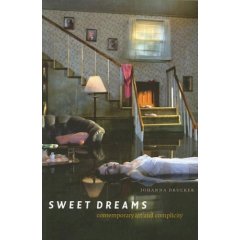February 28, 2007
Contemporary Art and Complicity

JL, blogger of Modern Kicks (who describes himself in this way:"I'm not too interested in who I am. No need for you to be, either." ...admirable in a Sergio Leone kind of way...) prompted me to buy Johanna Drucker's book, Sweet Dreams: Contemporary Art and Complicity today:
...her main thesis is "that the critical frameworks inherited from the avant-garde and passed through the academic discourses of current art history are constrained by the expectation of negativity. Fine art should not have to bear the burden of criticality nor can it assume superiority as if operating outside of the ideologies it has long pretended to critique." Drucker's target here is not simply or even primarily the old bugbears of modernism, but instead their postmodern successors, especially as articulated in the work of writers around October or influenced by the same. That art should legitimate itself through strategies of opposition toward or escape from society and commerce stands, for Drucker, as a futile, illusory goal. "Ours is a messy condition," she writes: one moment we are reflecting on the highest ends of high art, the next moment we're gossiping about who wore what at the Oscars--and sometimes these activities bleed into one another. Gestures of opposition are expected from artists who turn immediately to the application for grants or the pursuit of sales (not any fault of their own, for we all have to get by in this messy world.) Those same gestures, if alluring enough, are turned into fodder for the culture industry they allegedly defy (I was surprised to see no reference to Thomas Frank here.)After reading this, I let my Amazon 1-click fly.
Familiar enough stuff, at least in part, but what engages is what Drucker does with it. First, she argues that artists in recent years (of the past decade or so) have increasingly accepted this complicity, even embraced it, and gone about creating their work from a viewpoint that acknowledges it. The mix of high and low source material (not in the ironic, distancing manner of pop art, but as equally available sources), of different idioms or media, the broad range of subject matter approached without modern or postmodern anxieties, all these she sees as characteristic of this new art. As a result, the older critical traditions are unable, sometimes comically so, as she shows, to adequately address the work. And if the dream of art as opposition has died, Drucker still believes that art plays a role in changing our perceptions, even if nothing can be seen to follow programmatically from this fact.
(Emphasis Mine.) Posted by Dennis at February 28, 2007 7:13 AM
Leave a comment